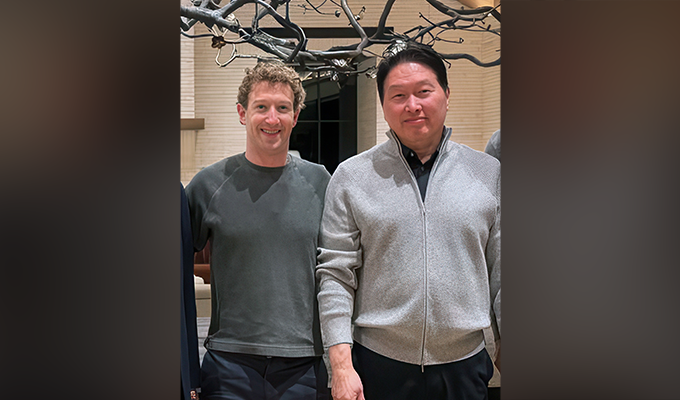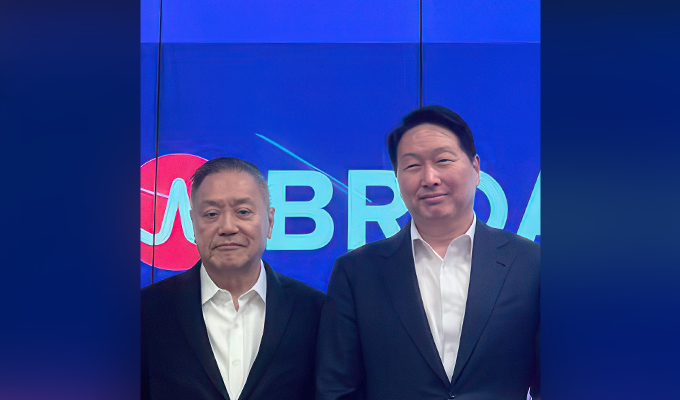The SK hynix Newsroom is running a series of interviews with the Top Team—the executives in charge of the company’s major business divisions. This series provides insights into the business strategies, organizational culture, and more promoted by the leaders to achieve the company’s vision. For this latest interview, the newsroom spoke with Vice President and Head of Front-End Procurement Seonghan Kim.

Global collaboration is crucial in the semiconductor industry. This is because semiconductor product fabrication can only be completed when the design and manufacturing process, as well as the supply chain of materials, components, and equipment—where companies across the world each hold their own competitiveness—is fully supported. However, semiconductor companies are facing difficulties in managing these supply chains as competition within the industry intensifies and the global geopolitical situation becomes increasingly unstable.
Today, it is becoming increasingly challenging for companies to respond to fluctuating demand and supply chain changes while maximizing profitability. To find out how SK hynix is operating in this uncertain global environment, the newsroom spoke with Seonghan Kim, head of Front-End (FE) Procurement. In this latest episode of the Top Team Insights series, Kim reveals how the company is establishing response strategies based on various scenarios, while sticking to the essence of its procurement work.
Going “Back to Basics” for Enhanced Buying Power
FE Procurement purchases materials, components, and equipment required for the front-end process and supplies them to the field. While quality, cost, and technological performance are the department’s basic considerations, it also plays a key role in optimizing task flow by managing the entire delivery process and forecasting demand. To increase FE Procurement’s purchasing competitiveness, members are establishing strategies to reduce total cost of ownership (TCO)1, securing capacity (CAPA), optimizing suppliers, and allocating volumes.
1Total cost of ownership (TCO): All costs incurred to purchase, install, and maintain a product or service.

Kim emphasized how FE Procurement benefitted from focusing on its core duties
“The Procurement division, including FE Procurement, is responsible for securing quality subcontractors while reducing costs to increase product competitiveness,” said Kim. “Previously, the division’s role was focused solely on procurement. However, it has grown in importance both internally and externally, expanding to include technology procurement, global sourcing, and supply chain ecosystem management. FE Procurement also plays an important role in ensuring the timely supply of key equipment, such as extreme ultraviolet (EUV) lithography, which is essential for wafer production.”
Recently, Kim conducted a reorganization of his department to increase the effectiveness of its expanded role.
“By integrating aspects of development and mass production and establishing a new Fab Materials Procurement team, we have created an environment that fosters systemic collaboration,” Kim revealed. “We also strengthened the role of the Equipment and Components Procurement team while newly establishing the Risk Management team, which is responsible for supply chain management and compliance activities. With this reorganization, FE Procurement was given the foundation to address various issues with greater expertise and flexibility.”
While the role of procurement is becoming more diverse and important, Kim emphasized that ultimately it is important to go “back to basics” and carry out the tasks expected of the department.
“In the AI era where everything is rapidly changing, situations and roles are bound to become complex. In order not to lose direction and momentum in this environment, we need to focus on our core duties, and only then can we achieve results,” Kim stated. “The essence of procurement is ‘making competitive purchases in the face of contingencies.’ Everyone in our department has taken this to heart and is doing their best in their respective positions with a ‘back to basics’ attitude.”
Focusing on Core Duties to Overcome the Downturn & Meet HBM Demand
Kim’s emphasis on the “basics” is reflected in the progress the Procurement division has made in overcoming the recent industry downturn.

Kim revealed how supply chain diversification helped SK hynix overcome the downturn
“During the downturn, Procurement helped drive down company-wide costs by reducing investments and increasing cost competitiveness,” Kim said. “We frequently negotiated unit prices and identified collaborative items with the Manufacturing and Technology divisions to reduce operating expenses (OpEx). At the same time, we dealt with contingencies such as global instability and the AI explosion. By securing our supply chain, continuously monitoring delivery times, and expanding production capacity, we were able to respond stably to fluctuations in memory demand.
“Above all, we diversified our supply chain to lower costs and reduce the risks of a single supply chain,” Kim emphasized. “To this end, we implemented supply chain ESG management by providing ESG consultations to suppliers and conducting on-site assessments related to carbon reduction. We also secured multi-faceted market intelligence (MI)2 through collaboration with relevant departments and suppliers, to fine-tune our market forecasting system. All of this was possible because we focused on the essence of ‘executing competitive purchasing.'”
2Market intelligence (MI): Data collected and analyzed by a company to understand the market environment and make strategic decisions.
Despite SK hynix’s successes in overcoming the industry downturn and capitalizing on the semiconductor boom, Kim claimed that the real work lies ahead. From expanding procurement to preparing for the future semiconductor market, the company has a lengthy to-do list. In particular, the most pressing challenges are geopolitical issues and growing global instability.
“As the international situation becomes increasingly unstable, a challenging environment is emerging across the entire procurement process, with the supply of certain items becoming limited,” Kim claimed. “To overcome this, we are utilizing all available resources within the legal and institutional frameworks to secure market information and reduce uncertainty. We are responding quickly to changes in major supplier policies and strategies, strengthening our supply chain risk monitoring system, and regularly publishing market intelligence and supply chain-related reports to enhance our members’ insights.”
In addition, Kim emphasized that he is committed to maintaining the company’s position as the number one HBM provider.
“Our goal is to secure the company’s leadership in the AI memory market by quickly procuring key materials and components,” he said. “We also aim to help achieve our management goals by efficiently managing capital expenditure (CapEx) and OpEx. In the long term, we plan to reduce the TCO and support the smooth development of future semiconductor products. In addition, we will build a supply chain system that is resilient to geopolitical issues and achieve net zero with our partners through step-by-step ESG policies.”
Rapidly Responding to Geopolitical Issues
Kim said that another one of the “basics” of his and the company’s role is supporting the growth and development of employees.

Ethical awareness is a key quality for SK hynix employees, according to Kim
“The success of a project and how much we can achieve depends on the competitiveness of our members,” Kim stated. “We are supporting them in many ways so that they can conduct deep analysis, negotiate diligently, and strive for win-win situations with our suppliers. Moreover, we are also encouraging them to adopt a service-oriented attitude at work so they consider their fellow employees as customers.”
Above all else, Kim emphasizes that all SK hynix employees must possess “ethical awareness.”
“Each team member represents the company in their respective roles. Their decisions can influence the dynamics of domestic and international supply chains,” Kim added. “Because of this, the role requires huge responsibility, and it is essential to comply with relevant laws and institutions. We always emphasize that compliance and ethical management must take precedence over any performance or reward.”
Wrapping up the interview, Kim said that the current semiconductor market conditions must be viewed with caution, and that the company will continue to thoroughly prepare for the future.
“Uncertainty is growing amid escalating supply chain risks and geopolitical issues. As a result, we will continue to think about Procurement’s role in responding to this rapidly changing environment,” Kim said.
“However, we’re more confident than concerned. Even throughout the pandemic and the downturn, we have reorganized and created foundations to soar higher. If all members work together to increase our competitiveness, we will enjoy a brighter future. FE Procurement will continue to vigilantly monitor and respond to changes and do our utmost to strengthen our competitiveness.”








